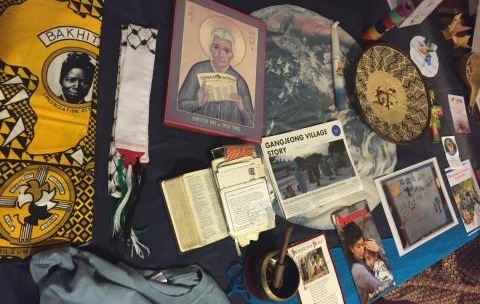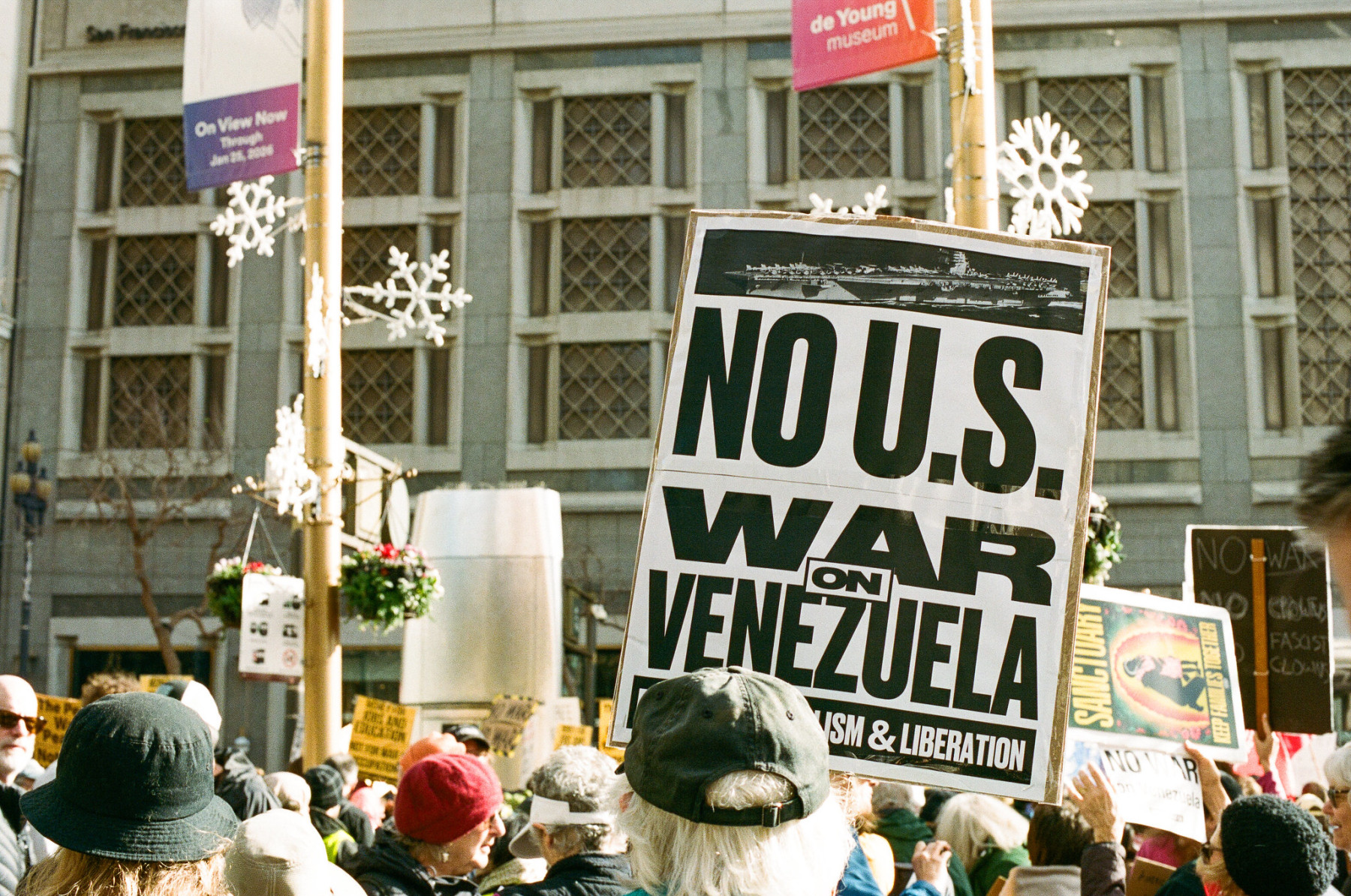글: 팻 커닝햄(Patrick Cunningham, 성골롬반외방선교회)
번역: 구로(미남 목사, 전쟁없는세상)
카톨릭은 오랫동안 ‘정당한 전쟁(Just war)’을 전쟁에 대한 공식입장으로 채택해왔습니다. 정당한 전쟁은 용인하겠다는 이 입장 아래에서 정당한 전쟁의 요건을 매우 까다롭게 만들어가는 것으로 현실 세계의 전쟁에 대한 입장을 표명했습니다. 최근 카톨릭 안에서 ‘정당한 전쟁’ 이론을 폐기하고 더 비폭력적이고 평화적인 ‘정당한 평화’를 카톡릭의 공식 입장으로 채택해야 한다는 움직임이 일고 있습니다. 이번에 로마에서 열린 ‘비폭력과 정당한 평화: 비폭력에 대한 가톨릭의 이해와 책무를 위한 회의’에 참석한 펫 커닝햄 신부님이 참가기를 보내주셨습니다. 전쟁에 대한 카톨릭 내부의 성찰과 입장 변화 움직임을 잘 설명해주셨습니다.
나는 최근에 ‘비폭력과 정당한 평화: 비폭력에 대한 가톨릭의 이해와 책무를 위한 회의’에 참가 하였다. 이 회의는 ‘그리스도의 평화 국제위원회(Pax Christi International)’와 ‘교황청 정의평화평의회’가 주최하고 4월 11일부터 13일까지 로마에서 열린 회의였다. 프란치스코 교황의 지도하에 있는 가톨릭교회가 교회의 폭력과 ‘네 원수를 사랑하라’고 말씀하신 예수님의 진정한 의미를 고백하도록 하는 것이 주최자들의 목표였다. 내 생각에 이 회의의 목적은 예수의 비폭력이 가톨릭교회의 중심에 오도록 재조정하고 비폭력과 정의로운 평화에 관한 가톨릭교회 문서(회칙) 제정으로 이어지는 과정의 하나라고 생각된다. 신앙과 폭력이 공존할 수 없다면, 신앙과 비폭력이 공존할 것이다.
회의에는 아프리카, 북미, 남미, 아시아, 유럽, 중동, 오세아니아에서 온 평신도, 신학자, 수도사, 사제, 주교 등이 참석하였다. 이 회의는 85명의 참가자들과 출신 공동체의 생생한 경험으로부터 가톨릭 전통 안에서의 비폭력에 대한 새로운 관점을 찾고자 하는 최초의 역사적 행사였다. 개막식에서 피터 턱슨 추기경을 통해 전달된 프란치스코 교황의 다음과 같은 메시지는 이 회의의 소임을 나타내고 있다.
“비폭력의 도구를 활성화시키려는 여러분의 생각, 특히 적극적인 비폭력에 대한 생각은 긍정적이고 필요한 공헌이 될 것입니다.”
새롭고 창조적인 ‘정당한 평화’ 패러다임을 구상하기 위해 ‘정당한 전쟁’이라는 케케묵은 이론을 폐기해야 할 필요성은 심오하면서 부인할 수 없는 것이었다. 분쟁 지역에 살고 있는 참가자들의 반복되는 강력한 메시지는 그들의 공동체가 폭력에 지쳤으며 폭력은 효과가 없고 해답이 아니라는 사실을 진술하는 것이었다. 즉, 폭력은 평화가 아니라 더 심한 폭력과 유혈 사태, 혼돈으로 이끈다는 것이다. ‘가톨릭교회가 복음적 비폭력의 구심이라는 본연의 역할에 충실할 것을 위한 호소’(성명서 원문 보기)에서 우리는 ‘정당한 전쟁이 없다는 것을 믿는다.’고 분명하게 진술하고 있다.
1700년 동안 ‘정당한 전쟁론’과 ‘거룩한 전쟁이론’은 전쟁을 예방하고 제한하는 것이 아니라 지지하는 것에 사용되었고 그리스도인이 전쟁에 참여하는 것, 십자군, 마녀사냥, 유대인과 무슬림 박해, 노예제 유지와 폭격의 성공을 위해 축복을 내려주는 것과 같은 일에 쓰여 졌다. 또한 ‘정당한 전쟁론’은 분쟁 현장에서 비폭력적 변혁을 위한 도구와 능력을 개발하는 도덕적 의무를 저해시켰다.
복음적 비폭력과 일치하는 새로운 체계가 펼쳐지고 있고 우리 교회 안에도 분명한 표현들이 있지만 가톨릭교회가 ‘정당한 평화’로의 패러다임 전환을 더욱 개발해야 한다는 것은 명백하다. 가톨릭교회가 ‘정당한 전쟁론’을 정식으로 폐기해야 한다는 요구에 거의 만장일치의 찬성이 나왔지만 아마도 그 중에서 가장 열렬한 요청은 노벨평화상 수상자인 메어리드 맥과이어로부터 나왔을 것이다. ‘전쟁, 군사주의, 학살을 축복했던 잘못된 시대는 반드시 역사 속에 사라져야만 합니다.’ 그리고 그녀는 그리스도인들이 무기를 들고 싸우지 않음으로서 교회를 예수의 삶과 가르침의 비폭력으로 돌려놔야 한다고 말했다.
“‘정당한 평화’의 방법은 비전과 평화를 구축하고 폭력적인 분쟁의 아픔을 예방하고 진정시키고 치유하는 윤리를 제공합니다.”
그러나 가장 당면한 작업은 가톨릭교회 내에서 교회와 다른 신앙, 종교를 가진 사람들 사이에 비폭력에 관한 전 지구적 대화를 시작하는 것이다. 성명서가 회의에서 지지하는 사람들만의 것이 아니라 가톨릭과 전 세계의 신앙 공동체에 의해 승인되어야 한다. 회의를 촉진하고 시작하게 하였던 신학적 성찰 및 관점의 대화와 의견교환의 과정들은 향후 비폭력에 관한 가톨릭 사회교리를 발전시키고 개발하는 데 없어서는 안 되는 것이다.
고백:
교회 안에서의 비폭력의 확산 또는 옹호를 위해 우리는 먼저 복음적 비폭력이 고백과 화해로 우리를 부른다는 것을 인정하면서 우리가 폭력을 자행했던 것에 대해 책임을 져야할 필요가 있다.
정신의 탈식민화
- 우리는 오랫동안 전쟁, 침략과 폭력이 우리의 문제를 해결하는 유일한 방법이라는 신화를 믿어왔다. 군산복합체는 그들의 활동을 정당화하고 승인 받기위해 ‘정당한 전쟁론’을 선전하는 전략으로 교회를 사용해왔다. 만약 프란치스코 교황이 회칙에 있는 ‘정당한 전쟁론’을 끝내고 전 세계적인 군사체계에 대한 동의를 철회한다면 전쟁과 억압의 체제를 지지하는 것에서 ‘정당한 평화’로의 극적인 패러다임 전환을 나타내는 것일 것이다.
- 우리는 전쟁에 관련된 가르침을 잊을 준비가 되어 있는가?
- 우리는 우리의 정신을 탈식민화하고 사랑의 위치로 우리의 마음을 돌려놓을 준비가 되어 있는가?
- 우리가 비폭력의 길을 계속 따라 갈수 있게 정신의 탈바꿈을 하도록 우리 자신과 우리의 교회에 요청하는 것과 ‘정당한 평화’는 시급한 일이다. 가톨릭교회는 우리가 잊어야만 하며 반박해야만 하는 구원하는 폭력의 신화를 유지하고 있다.
- 비폭력적으로 폭력과 부정의한 상황을 해결하기 위해 노력하는 무수한 비폭력 대안들이 존재한다. 회의의 성명서에는 양심에 따른 병역거부, 비폭력 저항, 회복적 정의, 트라우마 치유, 비무장 민간인 보호와 여타의 평화 구축 전략을 포함하여 비폭력 전략을 촉진하는 ‘정당한 평화’라고 불리는 전통을 고양시키자고 제안한다. 이 회의는 이러한 약속/전략을 포함시킨 최초의 바티칸 회의이다. 비폭력 전략에는 두 가지 측면이 있다. ‘나는 당신의 불의에 협조하지 않을 것이다. 하지만 나는 당신에게 열려 있다.’
전쟁을 위해 필요한 자원을 평화와 공공선을 위해 쓰게 된다면, 세계는 더 나아지게 될 것이다.
(원문)
Nonviolence and Just Peace
by Pat Cunningham
Recently I had the opportunity to attend a conference on Nonviolence and Just Peace: Contributing to the Catholic Understanding of and Commitment to nonviolence. It was hosted by Pax Christi International and the Pontifical Council on Justice and Peace and held in Rome from April 11-13. It was a dream of the organizers that the Catholic church under the leadership of Pope Francis would lead the church to confess its violence and secondly that Jesus really meant it when he said ‘love your enemies’. I guess the whole purpose of the conference was that it would be part of a process which would lead to a major Catholic church document (encyclical) on nonviolence and just peace, re centering the Catholic church in the nonviolence of Jesus. If faith and violence are incompatible then faith and nonviolence are compatible.
Participants gathered from Africa, the America’s, Asia, Europe, the Middle East, and Oceania and included lay people, theologians, and members of religious congregations, priests, and bishops. It was a landmark event, the first of its kind within the Catholic tradition in seeking to explore fresh new perspectives on nonviolence from within the lived experience of the 85 participants and the communities from which they hailed from. A message from Pope Francis delivered by Cardinal Peter Turkson during the opening ceremony set out the task for the gathering, namely: “your thoughts on revitalizing the tools of nonviolence, and of active nonviolence in particular will be a needed and positive contribution”.
The need to abandon the tired old chestnut of ‘Just War’ theory to envision a fresh, new and creative ‘Just Peace’ paradigm was undeniable as it was profound. Time and again the overwhelming message from participants living in situations of conflict was that their communities are weary of violence and stated time and again was the fact that violence never works and is never the answer-it never leads to peace but only to further violence, bloodshed and chaos. The strongly worded statement: ‘An appeal to the Catholic Church to recommit to the centrality of gospel nonviolence’ (see text http://www.paxchristi.net/) states unambiguously that “We believe that there is no ‘just war’.”
For over 1700 years, ‘just war theory’ and ‘holy war theory’ has been used to endorse rather than prevent or limit war and has led to Christians waging war, leading crusades, burning women at the stake, persecuting Jews and Muslims, keeping slaves and blessing conquests as noble acts as well as praying for successful bombing missions. “Suggesting that a ‘just war’ is possible also undermines the moral imperative to develop tools and capacities for nonviolent transformation of conflict”.
A new framework consistent with gospel nonviolence has been unfolding for some time and is evident in the statements within our churches but that the Catholic Church needs to develop further a paradigm shift to a ‘just peace’ is abundantly clear. While there was almost complete unanimity in calling for the Catholic Church to officially renounce ‘just war’ theory, perhaps the most passionate call came from Nobel Peace Prize winner Mairead Maguire who stated that the ‘misguided age of blessing wars, militarism and killing must be abolished’ and she called on Christians never to take up arms thus enabling the church to return to the nonviolence of Jesus’ life and teachings.
“A Just Peace approach offers a vision and an ethic to build peace as well as to prevent, defuse, and to heal the damage of violent conflict.”
The most immediate task however is to initiate a global conversation on nonviolence within the Catholic church, between the churches with people of other faiths and religions, and with the larger world, whereby the statement would not be the exclusive ownership of those who endorsed it at the conference but would be endorsed by Catholics and faith communities the world over. A process of dialogue and exchange of theological reflections and views which the conference facilitated and initiated was indispensible in helping to foster and develop Catholic social teaching on nonviolence going forward.
Confession:
For any spreading or promotion of nonviolence in the Church we first need to take responsibility for the ways we have perpetrated violence with the acknowledgement that gospel nonviolence call’s each of us to confession and reconciliation.
Decolonizing the mind:
- We’ve believed the myth for so long that war, aggression and violence is the only way to solve our problems. The military/industrial complex has used the church as part of its strategy to propagate the theory of ‘just war’ to justify and validate their actions. If Pope Francis calls for an end to the ‘just war’ theory in an encyclical and therefore withdraws consent from military systems globally this would represent a dramatic paradigm shift from propping up systems of war and oppression to working to a ‘just peace’.
- Are we ready to unlearn all of our indoctrination around war?
- Are we ready to decolonize our minds and shift our hearts back to a position of love?
- Calling on ourselves and our churches to undergo this transformation of mind so that we can continue along the path of nonviolence and just peace is an urgent task. The Catholic Church sadly has maintained the myth of redemptive violence which we need to unlearn and refute.
- Innumerable nonviolent alternatives exist to grapple with situations of violence and injustice nonviolently. The conference statement lifts up/proposes a tradition that is already emerging called ‘just peace’ which promotes nonviolent strategies including conscientious objection, nonviolent resistance, restorative justice, trauma healing, unarmed civilian protection and other peace building strategies. This was possibly the first Vatican conference ever to include such words/strategies. The nonviolent strategy has two hands-‘I will not cooperate with your injustice but I’m open to you as a human being’.
It strikes me that if the same resources, made freely available for war were redirected for peace and the common good, the world would be in a much better place.








![[성명] 미얀마 군부 쿠데타 5년: 징병제 부활로 심화되는 인권 위기](https://withoutwar.org/www_wp/wp-content/uploads/2026/01/myanmar-45x45.png)
![[국제공동성명] 병역거부자이자 인권활동가, 유리 셸리아젠코 탄압에 대한 긴급 성명](https://withoutwar.org/www_wp/wp-content/uploads/2026/01/123123-45x45.jpg)
![[보도자료] 대체복무제도 개선방향 모색을 위한 국회 토론회](https://withoutwar.org/www_wp/wp-content/uploads/2026/01/IMG_8696-45x45.jpg)
![[성명] 병역거부자를 가두는 나라에 양심의 자유는 존재하지 않는다 – 병역거부자 나단의 항소심 유죄 선고에 부쳐](https://withoutwar.org/www_wp/wp-content/uploads/2026/01/nadan-45x45.jpg)
![[평화를 살다] “요리하고 먹고 저항하라” – 팔라펠과 후무스](https://withoutwar.org/www_wp/wp-content/uploads/2026/02/5-45x45.jpg)
![[평화를 읽다] 역사를 품은 그림, 쓸쓸함을 알아차리는 다정함 – 『어느 쓸쓸한 그림 이야기』를 읽고](https://withoutwar.org/www_wp/wp-content/uploads/2026/02/book-45x45.jpg)

